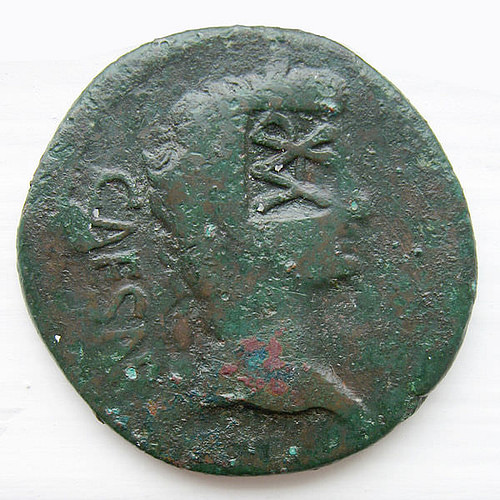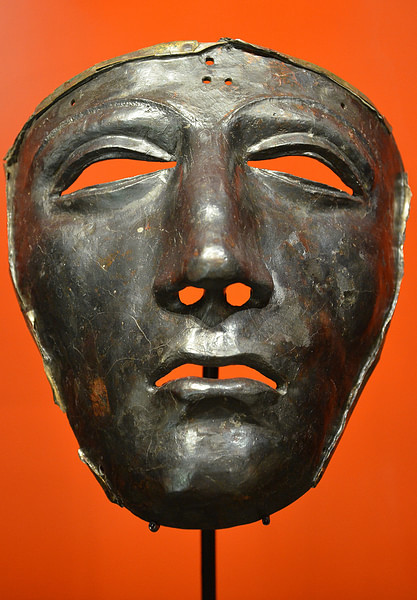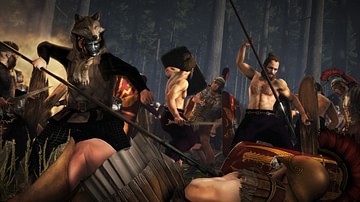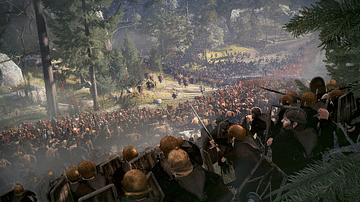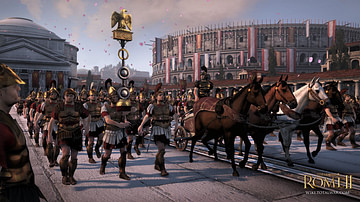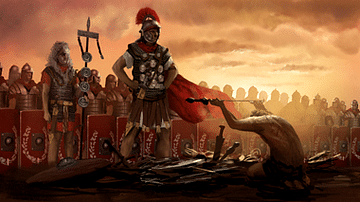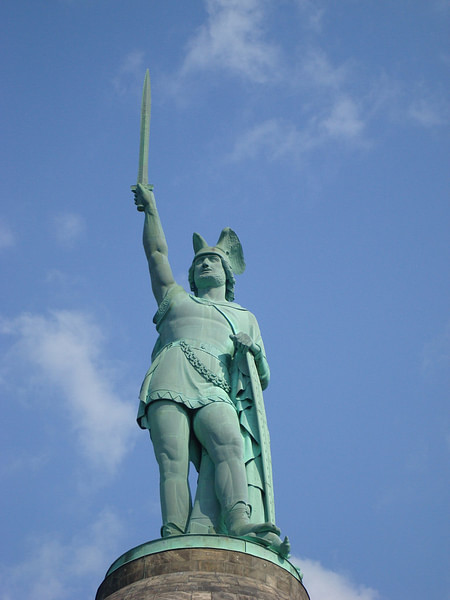
The Cherusci noble Arminius (c. 18 BCE - 19 CE) led the resistance to Roman conquest of Germania during the years 9-16 CE. Likely raised as a child hostage in Rome, Arminius gained command of a German auxiliary cohort in the Roman army. Posted on the Rhine, Arminius served under the command of Governor Publius Q. Varus. Varus' task was to complete the conquest of Germania but his rough-handed methods and demands for tax incited the tribes into revolt. Seeing his countrymen oppressed by the Romans, Arminius became the leader of the rebels. In 9 CE Arminius lured Varus into an ambush in the Teutoburg Forest. Varus fell on his sword as his legions were decimated around him. It was one of Rome's worst defeats and caused Emperor Augustus (r. 27 BCE - 14 CE) to abandon the conquest of Germania.
Nevertheless, the Roman hero Germanicus continued to lead campaigns of retribution. Arminius suffered defeats but won the war when Germanicus was recalled to Rome by the new Roman emperor Tiberius (r. 14-37 CE). Having successfully liberated and defended Germania against the Romans, Arminius next squared off against Maroboduus, the powerful king of the Marcomanni. Defeating Maroboduus, Arminius had become the most powerful leader in Germania. Arminius aspired to be king but many tribal factions resented his authority. Betrayed by his relatives, Arminius was killed in 19 CE.
Arminius in the Service of Rome
Born c. 18 BCE, Arminius was the eldest son of the Cherusci chief Segimer. To secure peace with Rome, Segimer is thought to have surrendered both Arminius and his younger brother Flavus to Rome as child hostages. Raised like noble Romans, the brothers learned Latin and became gained experience in Roman warfare. Most likely both brothers fought beside the legions under Tiberius Claudius Nero, stepson of Emperor Augustus, suppressing the huge Pannonian and Illyrian revolts of 7-9 CE.
Around 8 CE Arminius was transferred to the Rhine to serve under Governor Publius Quinctilius Varus. Varus' mission was to turn Germania Magna (Greater Germany), the tribal territories east of the Rhine, into a full-fledged Roman province. The tribes had largely been pacified in the Tiberius' campaigns of 4-5 CE. Tiberius had achieved more by negotiations and diplomacy than had been gained by two decades of warfare. Varus, however, demanded tribute and treated the natives like slaves. Soon the tribes simmered with revolt.
Varus trusted and liked his charismatic auxiliary commander, Arminius, who was also a useful liaison with the tribal nobility. During the summer of 9 CE, Varus marched his army of three legions and supporting auxiliaries from Vetera (Xanten) on the Rhine into central Germania. Varus' army took the route along the Lippe River and from there north to the western regions of the Weser Hills. He built a camp on the upper Weser River, right in the middle of Cherusci territory. Varus collected tribute and meted out Roman justice and law, and tribesmen came to trade at the huge Roman camp. For Arminius, however, it meant a chance to reunite with his family, and soon Arminius and Segimer sat together at Varus' table, assuring him all was well.
Arminius Turns against Rome
Arminius and Segimer's goodwill was but a farce, meant to fool Varus until it was time to throw off the Roman yoke. Although the Cherusci had received federated status within the Roman Empire, to Arminius it was clear that his people were not treated as equals. As he saw it, Rome took Germania's youths to fight in Rome's armies and the people were fleeced of what little wealth they possessed. The Romans even destroyed the land itself, cutting down the timber of ancient and sacred forests. Arminius met the chieftains in a secret glade to plot the Romans' demise.
Arminius knew that the legions would not go down easily. The huge Roman camp dwarfed the local villages, and its fortifications made the legionaries near invincible. The legionaries had better armor, weapons, and discipline than the Germanic warriors, the vast bulk of which were farmers. The nobles did have bands of well-armed personal retainers, but these were relatively few in number. To defeat the legions, Arminius united the tribes. He would lure Varus and his legions into the Teutoburg Forest. There the difficult terrain favored Arminius' lighter-armed, quick and nimble Germanic warriors.
Not all the Germanic chiefs were ready to give up the privileges they received from Rome. Arminius' uncle Inguiomerus opted to stay neutral while the herculean Segestes even revealed the conspiracy to Varus. Varus, however, thought Segestes' warning as nothing more than slander. Varus was well aware that Segestes did not like Arminius because Arminius had his eye on Thusnelda, Segestes' daughter, who was already betrothed to somebody else.
With the approach of fall, the Roman army prepared to march back to their winter quarters on the Rhine. At this time news arrived of a tribal revolt to the northwest. Arminius suggested that instead of taking the usual route to the Rhine via the Lippe Varus should take a different route north of the Weser Hills. That way he could crush the insurrection on the way. Varus took the bait and marched his three legions, auxiliaries, and supporting staff into the Teutoburg Forest.
The Battle of the Teutoburg Forest
Arminius rode away from the plodding Roman column after he told Varus that he was off to gather more reinforcements. Reinforcements came, not just from the Cherusci but also from the Marsi, the Bructeri, and from other tribes as well. They did not come to aid the Romans, though, but to destroy them. Segestes, however, remained loyal to Rome. He even tried holding Arminius captive for a while but was forced to release him. Having little choice, Segestes threw his lot in with the rebels.
The weather also turned against the Romans who were caught in a thunderstorm on the second day. Mud and puddles, overflowing creeks, and fallen branches slowed down wheel, hoof, and foot. Then the skirmishing attacks began. The barbarians showered the Romans with javelins and sling stones; striking at soldiers, civilians, and pack animals alike. Seasoned centurions tried to restore order and counter-attack but the terrain jumbled up Roman formations and their heavy armor made the legionaries too slow. Arminius was likely in the thick of it, personally leading the most critical attacks, as well as taking time to co-ordinate the deployment of the various tribal forces along the Roman route.
The weary Romans were able to entrench themselves for a night of much-needed rest. Varus was aware that Arminius had betrayed him and that he was faced with a major uprising. However, the way ahead seemed far shorter than backtracking to the Lippe. The next day Varus pressed on, abandoning most of his heavy and surplus equipment to lighten the load. At times the weather improved, at times the woods gave way to fields of long grasses, but the attacks continued.
![Battle of Teutoburg Forest [Artist's Impression]](https://www.worldhistory.org/img/r/p/750x750/2255.png?v=1713913143)
At least the legions were able to find suitable ground for their marching camp. By the end of the third day, Varus' army had reached the edge of Kalkrieser Berg (mountain), part of the northern extremities of the Weser Hills, which protruded into the Great Moor. Behind them, along the 12-20 mile (18-30 km) passage of the Roman column, lay thousands of their dead. During the night, the barbarians stormed the Roman camp and tore the breastwork to pieces. Varus fell on his sword before the last legion line protecting him was overwhelmed.
Probably due to premature looting by the tribesmen, a sizable Roman contingent managed to fight its way out. At first, it seemed that the survivors eluded any pursuer, but then the path ahead narrowed with the marsh on one side and an earth embankment on the other. A wall of stakes and interlaced branches topped the embankment and, behind it, more barbarians waited. The Romans desperately tried to break through but were repulsed. Fleeing into the marsh, all but a handful of were hunted down.
The Emperor Abandons the Conquest of Germania
Arminius addressed his victorious men and mocked the Romans. The tribesmen took terrible vengeance on the captured Romans, torturing and sacrificing their victims while slavery awaited the remainder. As an illustration of his own power, Arminius sent Varus' head to Maroboduus, the mighty King of the Marcomanni who dwelt in the area of today's Czech Republic.
Arminius next targeted the Roman fort of Aliso on the Lippe, where he displayed the heads of slain legionaries to the defenders. The camp commander answered with a volley of arrows, and though Arminius assaulted the camp, he could not take it. During a stormy night, the Romans managed to break out but abandoned the accompanying civilians to the enemy.
News of the destruction of three legions reached Emperor Augustus along with the head of Varus, courtesy of Maroboduus. An irate Augustus shouted, "Quinctilius Varus, give me back my legions" (Suetonius, The Twelve Caesars, II. 23). In light of the disaster in the Teutoburg, the Clades Variana, Augustus abandoned the conquest of Germania. Tiberius conducted minor offensives into Germania in 10 and 11 CE and then returned to Rome. With the elderly Augustus of failing health, Tiberius needed to ensure his own succession and so left behind his nephew Germanicus Julius Caesar to command the two armies guarding the Rhine frontier.
Arminius vs. Germanicus
Germanicus was only a few years younger than Arminius and in many ways his Roman counterpart. In the aftermath of Augustus' death and Tiberius' succession, the legions of Germania Inferior (the lower Rhine) revolted. Germanicus put down the rebellion, having to pay the legions to stand down. He channeled the frustration of the legionaries against the Germanic tribes, to avenge the Clades Variana. Germanicus started off in 14 CE by massacring Marsi villages and then fending off a dangerous tribal counterattack.
Arminius meanwhile was faced with a belligerent Segestes, who redeclared himself for Rome. Early in 15 CE, Arminius besieged Segestes' stronghold but was forced to retreat when Roman legions came to Segestes' aid. Segestes and his family were escorted to the safety of the Roman forts on the Rhine. Among them was Thusnelda, who against her father's wishes had married Arminius and was carrying his child. Tacitus relates Arminius' reaction to the loss of his pregnant wife:
Arminius, with his naturally furious temper, was driven to frenzy by the seizure of his wife and the foredooming to slavery of his wife's unborn child. "Noble the father," he would say, "mighty the general, brave the army which, with such strength, has carried off one weak woman. Before me, three legions, three commanders have fallen. Let Segestes dwell on the conquered bank...one thing there is which Germans will never thoroughly excuse, their having seen between the Elbe and the Rhine the Roman rods, axes, and toga. If you prefer your fatherland, your ancestors, your ancient life to tyrants and to new colonies, follow as your leader Arminius to glory…" (Tacitus, Annals, I.59)
Arminius' emotional appeals further unified and roused the tribes. His powerful uncle Inguiomerus finally joined the war against Rome.
Germanicus' next offensive was an all-out-assault on the Bructeri, involving four legions, 40 additional cohorts, and two mobile columns. The lands were devastated, one of the legion eagle standards lost in the Teutoburg was recovered, and the site of the Varus disaster was found. Burying all the bones of their fallen countrymen proved too great a task for even the legions.
Seeking vengeance, Germanicus advanced east toward the Cherusci. Outnumbered, Arminius fell back into the wilderness. Arminius lured the Roman cavalry into a deadly ambush in a swamp, but the legions came to the rescue in the nick of time. Short on supplies, Germanicus broke off the campaign and with four legions returned to his fleet on the Ems. The other half of the army, commanded by Aulus Caecina Severus, returned via the old Roman land route known as the 'Long Bridges' first pioneered by Lucius D. Ahenobarbus 18 years ago.
The 'Long Bridges' led through swampy ground, perfect for ambushes, which Arminius was quick to exploit. Arminius struck at Caecina's column while it was repairing a causeway. In a harrowing battle, Caecina was barely able to lead his army into a defensive position. The next morning, Arminius personally spearheaded the attack. He came close to inflicting a total defeat on Caecina when the tribesmen started looting. Caecina was able to fight his way out and find dry ground to entrench himself for the night. Arminius wisely wanted to wait until Caecina's army was again on the march and vulnerable. Inguiomerus, however, thought the Romans a beaten enemy and incited the overzealous chiefs and warriors into a night assault. Thinking the battle won, the tribesmen were overwhelmed and scattered when the Romans boldly sallied forth at the right moment. The defensive victory allowed Caecina to safely reach the Rhine.
In 16 CE Germanicus decided to alleviate his supply problems by embarking his entire army on a gigantic fleet of 1,000 ships. Arminius tried to retain the initiative by attacking a Roman fort on the Lippe, forcing Germanicus to delay his summer offensive and come to the rescue with six legions. Arminius was driven off, and Germanicus returned to the Rhine where he reinforced his army with Batavian cavalry from the Rhine Island, led by their chief Chariovalda. The Roman fleet sailed to the sea, east along the Mare Germanicum (North Sea) coast and up the River Ems. Disembarking, Germanicus led his army cross country, further east, towards the Weser and Cherusci territory.
Standing on the eastern bank of the Weser, Arminius came to face his brother Flavus, who was with Germanicus' army, across the river. A scar and empty eye socket disfigured Flavus' face. Arminius called across the water, taunting Flavus as to what Rome had given him for his disfigurement. Flavus proudly spoke of the battle, of rewards, and of the justice and the mercy of Rome. Arminius retorted with words of ancestral freedoms, the gods of the north, and their mother who was praying for Flavus to come back to their side. Each brother was deaf to the other. An enraged Flavus had to be physically restrained from plunging his steed into the water to fight his brother.
Arminius commanded over too few troops to seriously challenge Germanicus' river crossing, but his Cherusci ambushed the Batavians and slew their chief, Chariovalda. Falling back before Germanicus' column, Arminius gathered his army in the sacred wood of Hercules (the Roman name given to the German Donner and Scandinavian Thor). With Inguiomerus at his side, Arminius spoke to his assembled warrior: "Is there anything left for us but to retain or freedom or die before we are enslaved?" (Tacitus, Annals, II. 15)
Out from beneath the great forest strode forth the tribal warriors. Before them, the ground sloped down towards the Idistaviso plain, skirted by a bend in the Weser River. There the Roman army drew up; cohort after cohort of auxiliaries and of eight legions. Germanicus himself rode up with two cohorts of Praetorian Guards. The two forces clashed on the plain in a fierce battle. Arminius slashed his way through the Roman archers but was beset from all sides by auxiliaries. Arminius' face was smeared in blood as his horse broke through and carried him to safety. The battle ended in a resounding Roman victory. Barbarian casualties were heavy, scattered across the plain and into the forest beyond.
Arminius had suffered a defeat but was far from finished. Tribesmen were still arriving, more than making good his losses. He would make another stand in what was the battle of the Angrivarii barrier; a vast breastwork marking the border between the Angrivarii and the Cherusci between the Weser River and a forest. The Germans fiercely defended the barrier and drew the Romans into a confusing forest battle. Roman siege engines at last burst through the barrier. In the forest, Roman shield walls pushed the tribesmen against a swamp to their rear. His wound still hampering him, Arminius was less active. Inguiomerus led the attack but was unable to prevent another Roman victory.
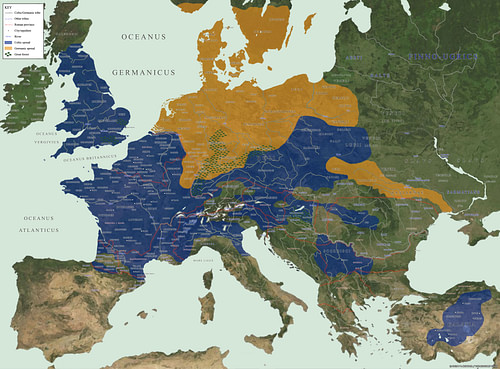
Arminius had lost another battle but not the war. Roman casualties were severe, the legionaries and auxiliaries were worn out and their supplies were in all likelihood nearly exhausted. Disaster struck on the sea voyage home, a storm wreaking havoc on both ships and troops. Even so, Germanicus was able to muster enough troops to inflict a terror campaign upon the Chatti and Marsi.
Against Germanicus' protests, Emperor Tiberius decided to call an end to the fruitless and costly campaigns. There would be no resumption of the war in 17 CE. Germanicus was honored with a lavish Roman triumph. Among the displayed captives were Arminius' wife Thusnelda and their toddler son, Thumelicus.
Arminius Strives to Become King
Arminius now held sway over much of Germania, his only rival was Maroboduus, King of the Marcomanni. According to Tacitus, "the title of king rendered Maroboduus hated among his countrymen, while Arminius was regarded with favor as the champion of freedom" (Tacitus, Annals, II. 88). As a result, the Langobardi and Semnones went over from Maroboduus to Arminius. Inguiomerus, however, joined Maroboduus.
Both Arminius and Maroboduus assembled their armies to meet in battle. In a pre-battle speech, Arminius boasted of his victory over the legions and called Maroboduus a traitor. Maroboduus, in turn, bragged that he held off Tiberius' legions, though in truth they had been diverted by the Pannonian rebellion. Maroboduus also falsely claimed that it was Inguiomerus who had brought about Arminius' victories. Both armies deployed and fought in Roman fashion, with units keeping to their standards, following orders, and keeping forces in reserve. After a hard-fought battle, it was Maroboduus who fled to the hills. His lands beset by other tribes, Maroboduus found asylum in Rome.
Arminius now had no rival in Germania. However, many tribesmen resented any authority and Arminius' ambitions to be their king. In 19 AD a Chatti chief came to Rome offering to poison Arminius. Rome refused, telling the chief that Rome took vengeance in battle and not by "treason or in the dark" (Tacitus, Annals, II. 88). Later that year, after tribal infighting that raged back and forth, Arminius was killed after being betrayed by his relatives. Tacitus left a poignant tribute to Arminius:
He was unmistakably the liberator of Germany. Challenger of Rome - not in its infancy, like kings and commanders before him, but at the height of its power - he had fought undecided battles, and never lost a war... To this day, the tribes sing of him. (Tacitus, Annals, II. 88)
As a military leader, Arminius showed intelligence, bravery, and charisma. He understood both the limitations and advantages of his own men and of his enemy. Arminius made skillful use of local terrain to defeat what was a superior trained and equipped enemy. Arminius also used his Roman training to improve the battlefield tactics of his own troops. In battle, he personally led attacks and was able to unite the tribes even after suffering tactical defeats. Arminius' victory in the Teutoburg forest and his resistance to Germanicus kept the Germanic tribes free of Roman dominion. Centuries later, their freedom would make possible the emergence of the nations of Germany, France, and England.
